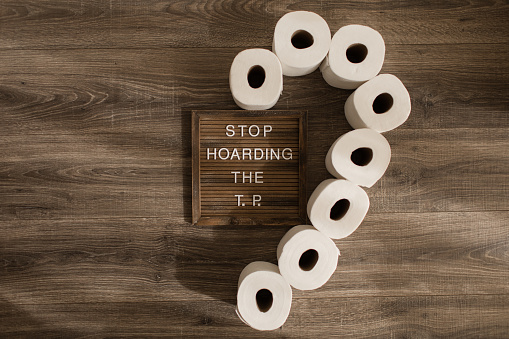How To Stop Hoarding

Hi, I am Betty Knight, Owner of this site! I…
We’re all guilty of it.
Having a de-cluttered house can get on your nerves and be a big blow to your self-confidence. We keep wanting to organize the home, but since the mess is overflowing and out of control, we’re never able to make much progress.
This can feel like a series of constant failures. We know we’ve been meaning to do it since forever, but why can’t we just get around to doing it?
Living in a space that feels disorganized and messy can also impact your mental health. You may think that your home life is chaotic and a bigger problem than you can solve.
The root problem for a messy house is usually that we have too much stuff. When we can’t identify what to throw away and what to keep, it’s difficult to clean up.

Here are some ways to manage compulsive shopping and get comfortable with throwing away things you no longer need:
Break it Up
It’s difficult to decide to clean in one day. We tend to put it off for the coming weekend or a designated holiday. The trouble with assigning it to Future You is that you have no idea what her plans or schedule will be like!
To start cleaning your house with the large objective of “sorting out everything” is unrealistic and de-motivating. Glancing around your home in upheaval, you’re going to want to give up in a few minutes and do something that makes you feel better — like binge eating or binge-watching.
Break it up into achievable mini-tasks.

Set aside tiny chunks of work to do every day. It can be as small as organizing one of the drawers in your kitchen. Aim to do it at a time where you know you will at least have one hour to spare. For many, that’s bright and early in the morning, and for some, it’s only after work at night.
As you finish each small task, make sure you celebrate! Reward yourself with a glass of wine and/or an episode of your favorite show. Make sure you share the news with your family, even if it seems silly. “I finally organized the kitchen drawer!”. It’s essential to show your loved ones how much organization matters to you. It may encourage them to contribute!
Make sure you schedule completes all the work you want to do. It may end up being a six-month project, but assign yourself small tasks until everything in the house has been taken care of. This way, we ensure that we don’t get complacent with half the house done and give up.
Let Go of Sentimental Value
There are so many things around our houses that we keep just for sentimental value. Maybe someone we love gave it to us, or it reminds us of a fond memory.
I remember keeping a whole box of seashells for 10 years in my bathroom because it reminded me of a perfect beach day I spent with my family.

I kept telling myself that one day I would drill holes in it and make a beautiful necklace.
Of course, that never happened.
It was an unnecessary oversized item to keep in my bathroom that cluttered the space.
I finally threw it away only when we were moving houses, and I had to seriously consider whether it was worth packing space. I should have thrown it away years ago without the threat of less packing space to force me to.
We somehow feel that letting go of something means that we aren’t cherishing its memory or the person who gave it to us.
But these memories and emotions don’t live in things.
They live in us.
If we realize that every object serves a specific finite purpose but cannot give us real happiness, we’ll come closer to being able to let go.
The real thing that gave me happiness was the memory of that beautiful family day on the beach. The seashells were an unnecessary souvenir. They didn’t help preserve that memory, and throwing them away didn’t change the memory in any way.
Make Strict Shopping Lists
If it’s not on the shopping list, it doesn’t make it in the shopping cart.

Write all your shopping lists at home, when you can cross-check to see if you already have it or not. We so often buy things that we ‘think’ have run out but actually already have. “I’m going to use it in the future, anyway!” is not an excuse!
Make detailed and specific shopping lists that mention brand and quantity. That way, you don’t buy huge family packs of things you won’t use.
Don’t let yourself buy anything that’s not on the list, no matter how useful. If you couldn’t think to write it on the list at home, it’s probably not that important.
Take someone with you! It could be your spouse or your friend. Tell them in advance to stop you if you’re buying something unnecessary off the list. This can make it easier to be accountable while shopping.
Don’t throw: give away!
We can feel guilty about just throwing things into the trash. Especially if these things have sentimental value, or we think they could be important to us in the future.
A good friend who also struggles with hoarding found it challenging to throw away the broken china set pieces. They were a 40-year-old set, passed down generations and made of beautiful porcelain — so it’s understandable.
Her daughter’s friend was taking a class on Kintsugi, the Japanese art of fixing broken pottery with gold. My friend gave her the broken set, and felt so relieved to give it away to someone who would use it!
Not everyone will find an escape from their hoarded objects with such serendipity, but the key take away is that we feel better giving away things to people who would benefit from them.
Consider having a yard sale.

If you still have things leftover from the yard sale, it’s possible that they either aren’t very useful or that your neighbors don’t like second-hand.
You can still always donate them to charity, or just correctly recycle!
The Benefits
Living a minimalist life without a de-cluttered house can do wonders for you. You’ll find yourself enjoying time spent much more in your home, and you’ll see how much happier your family is (even if they don’t admit it!). You’ll probably have much more money as well, and now you can spend on the things that really matter.

You’ll also discover, with strict and infrequent shopping, you begin to look elsewhere for happiness. Making the shift from seeking joy from tangible to intangible things is ground-breaking. In our materialistic world, we’re told that things make us feel better, but it’s really the experiences.
What's Your Reaction?
Hi, I am Betty Knight, Owner of this site! I am a 'nearing 30-year-old', happily married to 1 awesome man. We live in the beautiful tourist town of Franklin NY.


